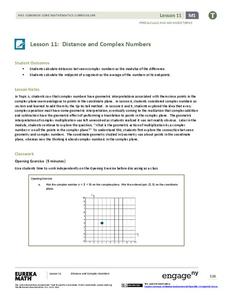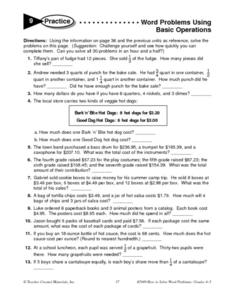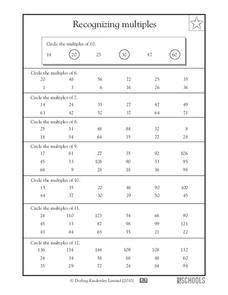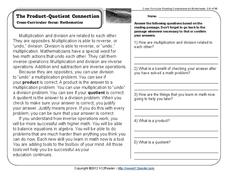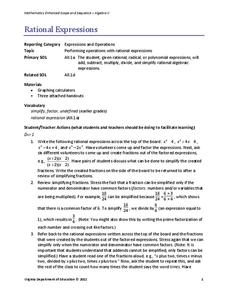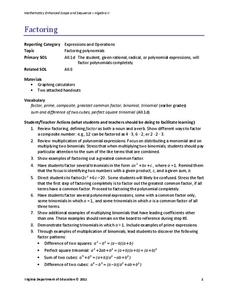Curated OER
Order of Operations
Learn the rules for the order of operations with an electronic activity. Learners evaluate whole-number expressions and translate a word problem into an arithmetic expression. The resource includes several examples for each rule.
Curated OER
Rationals
In this rational numbers worksheet, 9th graders solve 14 various types of problems relating to rational numbers that include simplifying each equation and reducing to lowest terms to using the order of operations to simplify equations....
Curated OER
Integers
In this integers activity, 8th graders solve 10 various types of problems to include rewriting each statement using the convention for Positive integers and then calculate their answer. They also rewrite each statements without the...
Curated OER
Make Your Own
In this number of operations worksheet, 2nd graders write 4 original word problems to go with 4 number sentences. Students write out their answers on the lines provided.
Virginia Department of Education
Order Up!
Order in the math class! Scholars learn to evaluate expressions using the order of operations. A game has them rolling number cubes to determine numbers to use when evaluating.
EngageNY
Base 10 and Scientific Notation
Use a resource on which you can base your lesson on base 10 and scientific notation. The second installment of a 35-part module presents scholars with a review of scientific notation. After getting comfortable with scientific...
EngageNY
Distance and Complex Numbers 1
To work through the complexity of coordinate geometry pupils make the connection between the coordinate plane and the complex plane as they plot complex numbers in the 11th part of a series of 32. Making the connection between the two...
National Math + Science Initative
Introduction to Decimals
Three activities make up an introductory lesson designed to create a strong foundation in comparing fractions to decimals and exploring and building decimal models. Pupils brainstorm and complete a Venn diagram to show how decimals and...
Curated OER
Word Problems Using Basic Operations
For this math instructional activity, students answer 30 word problems using basic operations. For example, in one of the questions students calculate how much a person spent according to the given lunch menu.
Curated OER
Go With the Flow
In this flowchart worksheet, 3rd graders follow the arrows and solve 3 mathematical equations by following the operation instructions on each one.
Charleston School District
Solving Equations by Combining Like Terms
How do you make these x's get along? Building on the previous lesson in the series, learners solve equations by combining like terms. The video uses objects to help pupils understand the concept.
Charleston School District
Solving Equations with the Distributive Property
Now there are parentheses in these equations? As the lessons continue in this series, equations get progressively more complex. Eighth graders solve equations by applying the distributive property before using inverse operations.
EduGAINs
Making Savvy Consumer Choices
It's never too early to learn about grocery budgeting. Middle schoolers delve into the world of consumer math with a lesson that focuses on both healthy choices and real-world math applications. Groups work together to form a grocery...
Lakeshore Learning
Comparing and Ordering Fractions
Math can be satisfying for the mind and the stomach! Incorporate slices of pizza into your fractions lesson with a set of informative resources. After a brief guided lesson on comparing and ordering fractions, young mathematicians...
Curated OER
Using Algebra Tiles to Explore Distributive Property
Math is fun with algebra tiles! Young mathematicians explore eight expressions involving the distributive property and use algebra tiles to expand simple expressions. The resource is perfect for both guided and independent practice.
Curated OER
Recognizing Multiples
Can your fourth graders recognize multiples of 10? What about 11 and 12? Use this worksheet to enhance your multiplication lesson, or to assess what your math students already know about finding multiples. Given six sets of numbers, they...
EngageNY
End-of-Module Assessment Task: Grade 8 Module 1
It's all in the numbers. Determine your pupils' level of understanding of scientific notation using this assessment task. The final lesson in the series assesses scholars on the application of scientific notation in real-life...
Curated OER
Related Addition and Subtraction
Warm up your mathematicians using this fact families learning exercise! Because the answer is explained below, consider projecting this for the whole class and uncovering the bottom half after collecting student responses. There are two...
Curated OER
A Beginning Look at Basic Algebra-Lesson 1-12
In this Algebra I worksheet, 9th graders explore the basic of beginning algebra: the order of operations, integer operations, translating phrases and sentences, and solving basic one-step equations. The six page worksheet...
Curated OER
Write a Number Sentence
In this number sentences worksheet, students read a math table for the number of pages read in a read-a-thon. students then write number sentences to solve the six problems.
K12 Reader
The Product-Quotient Connection
How are multiplication and division connected? Read a passage about inverse operations to find out how you can use products and quotients to check your work when completing an equation from the opposite operation.
Virginia Department of Education
Rational Expressions
Demonstrate the progression of operations with rational expressions through a multi-day lesson, equipped with worksheets for each day. High schoolers develop the concepts needed to perform operations with rational expressions....
Virginia Department of Education
Factoring
Uncover the relationship between factoring quadratics and higher degree polynomials. Learners develop their factoring skills through repetition. A comprehensive lesson begins with quadratics and shows how to use the same patterns to...
Noyce Foundation
Sewing
Sew up your unit on operations with decimals using this assessment task. Young mathematicians use given rules to determine the amount of fabric they need to sew a pair of pants. They must also fill in a partially complete bill for...








